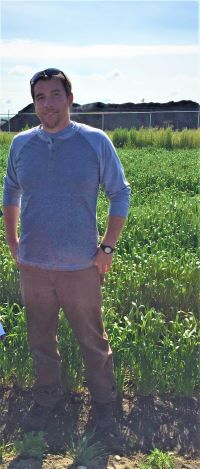| Peter O'Brien |

|
I grew up in Springfield, Illinois before attending Grinnell College, where I earned a BA in Religious Studies. After graduation, I spent several years serving as an Americorps member, first with Habitat for Humanity and then with the Nevada Conservation Corps. I then began graduate school at North Dakota State University, where I received an MS in Natural Resources Management and a Ph.D. in Soil Science, where I focused on soil reclamation after oil development in the western North Dakota. I moved to Ames in 2018 to begin a postdoc with Jerry Hatfield at NLAE, and I transitioned into a Research Agronomist in August 2020. My research program will investigate a series of management practices, with a special focus on cover cropping and diversified rotations, to help develop resilient, highly productive cropping systems.

Was there an event or a person who inspired you to become a scientist?
My inspiration to do what I do now really comes from my experiences with two contrasting mentors I had at North Dakota State University, David Hopkins and Tom DeSutter. David looks at a soil profile and can weave a magnificent story of glaciation and flooding that occurs at geologic timescales, whereas Tom will look at the same soil profile and assess how that soil acts now to produce crops and contribute to food security. Those viewpoints encapsulated for me how the soil acts as a link from the past to the present to the future, and that makes studying soil and agriculture both innately beautiful and innately humbling.
What attracted you to ARS or the NLAE?
I really wanted to join ARS, in general, because of the agency’s ability to tackle big, long-term problems, an ability that comes from both the enthusiasm and expertise of the personnel and the infrastructure and tools afforded to those personnel. NLAE, specifically, is a very exciting place for me to work because it exists at the intersection of agriculture and the environment. It is a perfect place to do the research that I want to do, which is to investigate both how agricultural practices are affecting the environment, as well as how the environment affects how we manage our agricultural systems.
What is your favorite aspect of conducting research?
My favorite part about research is when something doesn’t go how we expect it to because I think we do our best critical thinking when our research doesn’t go to plan. When we get unexpected results, or even have a failed experiment, the creativity and problem-solving that we undertake then can advance our science even more than projects that proceed smoothly from start to finish.
If you could achieve any research accomplishment in the next 5-10 years what would it be and why would you choose it?
I would really like to have my research program contribute to identifying a series of management practices that make our agricultural systems more sustainable, profitable, and productive in the face of climate change. Adapting our systems to the new climate regime is the most important step we can take to reduce further contributions to climate change, increase economic prosperity across the US, and maintain food security into the future.
Tell us something about yourself that might surprise people who know you?
I spent several years learning ancient Greek and was lucky enough to spend some time traveling through Greece studying language, history, art, and architecture. While my ability to read and understand the language has long since faded, that experience really enhanced my understanding of (and appreciation for) English.
